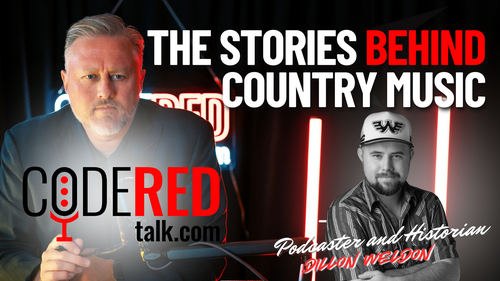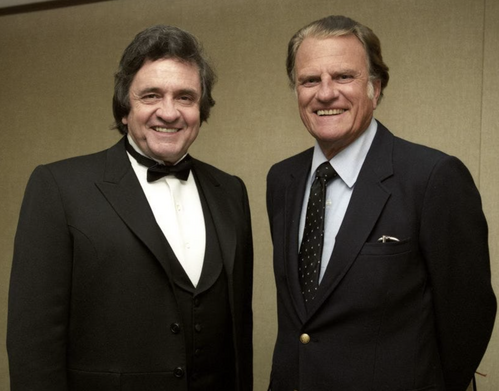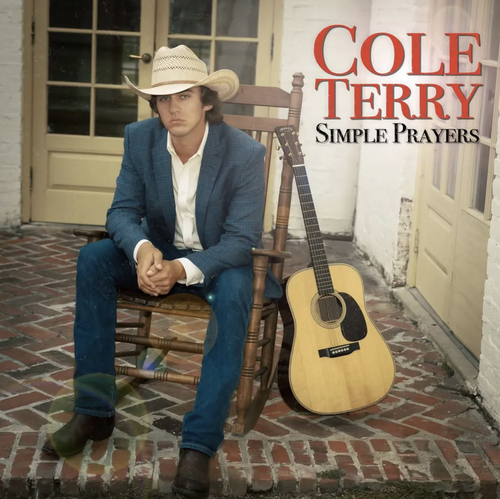October 29th, 2025
by Zach Terry
by Zach Terry
The Church and the Honky-Tonk
How Gospel Shaped Country Music
A Sacred Song in a Secular Sound
Long before country music filled stadiums and arenas, it filled small wooden churches. The twang of a steel guitar and the rhythm of a snare drum owe as much to the Sunday morning hymn as to the Saturday night dancehall.
In my latest Code Red Podcast, Country Music Historian and Podcaster Dillon Weldon delve into those roots:
In my latest Code Red Podcast, Country Music Historian and Podcaster Dillon Weldon delve into those roots:

When you trace the roots of country music, you find a surprising thing: the Gospel got there first. The same voices that once cried out for mercy in revival tents soon told stories of heartache, redemption, and grace over a fiddle and guitar.
Country music and church music share a common soul — one that understands both the ache of sin and the hope of salvation.
Country music and church music share a common soul — one that understands both the ache of sin and the hope of salvation.
The Church House Was the First Stage
In my recent conversation with Dylan Weldon, host of The Drifting Cowboy Podcast, we talked about the deep, often-overlooked relationship between Christianity and country music.
Dylan reminded me that the country greats — from Hank Williams to Merle Haggard, Waylon Jennings, and Willie Nelson — were shaped not just by bars and backroads, but by the Bible and the Baptist hymnbook.
Even the “outlaws” of Nashville knew their way around a pew.
Before Nashville became a business, it was a testimony.
Dylan reminded me that the country greats — from Hank Williams to Merle Haggard, Waylon Jennings, and Willie Nelson — were shaped not just by bars and backroads, but by the Bible and the Baptist hymnbook.
Even the “outlaws” of Nashville knew their way around a pew.
- Hank Williams Sr. sang hymns in church before he ever wrote “I Saw the Light.”
- Willie Nelson grew up singing gospel standards like “Family Bible” and credits those harmonies for shaping his style.
- Johnny Cash often said, “The Gospel songs are the foundation of my faith — and my music.”
Before Nashville became a business, it was a testimony.
Johnny Cash: The Man in Black Meets the Man on the Cross
Perhaps no one embodies this intersection better than Johnny Cash.

Cash was raised in the cotton fields of Arkansas, where his mother taught him to sing gospel songs. But fame, addiction, and rebellion pulled him far from his roots.
Then in 1968, at the height of his career, Johnny Cash met Jesus Christ again — not in a chapel, but in a cave near Chattanooga. He later said he went there intending to die, but instead found life. “God saved me in that cave,” he said.
After his conversion, Cash began closing his shows with Gospel songs, and he publicly aligned himself with Billy Graham. He performed at multiple Graham Crusades, telling audiences, “Being a Christian doesn’t mean you’re perfect. It means you’ve got somewhere to go when you fall.”
His 1971 album The Gospel Road was a cinematic retelling of the life of Christ — part sermon, part song, part confession. Cash never stopped singing about sin, but now he sang about the Savior who conquered it.
Then in 1968, at the height of his career, Johnny Cash met Jesus Christ again — not in a chapel, but in a cave near Chattanooga. He later said he went there intending to die, but instead found life. “God saved me in that cave,” he said.
After his conversion, Cash began closing his shows with Gospel songs, and he publicly aligned himself with Billy Graham. He performed at multiple Graham Crusades, telling audiences, “Being a Christian doesn’t mean you’re perfect. It means you’ve got somewhere to go when you fall.”
His 1971 album The Gospel Road was a cinematic retelling of the life of Christ — part sermon, part song, part confession. Cash never stopped singing about sin, but now he sang about the Savior who conquered it.
Outlaws, Saints, and Sacred Steel
The so-called “outlaw movement” of the 1970s — led by Waylon Jennings, Willie Nelson, and others — wasn’t as godless as people think. Beneath the grit and rebellion was often a longing for grace.
In each case, the same hands that strummed the bar chords also raised in worship on Sunday.
- Waylon Jennings, once addicted and near ruin, later recorded “Storms Never Last” with his wife Jessi Colter, a song of faith and endurance.
- Merle Haggard, who spent time in prison before fame, often spoke of his conversion and wrote “He Walks with Me” and “Are the Good Times Really Over?”, reflecting the moral erosion he saw in American culture.
- Elvis Presley, though known as the King of Rock ’n’ Roll, recorded more Gospel albums than any other genre — because he said it was the only music that truly gave him peace.
In each case, the same hands that strummed the bar chords also raised in worship on Sunday.
From the Choir to the Chart
Country music has always given ordinary people permission to sing about real life — heartbreak, home, and heaven. It became the soundtrack of a faith that wasn’t polished but personal.
You can’t separate the sound of the South from the story of salvation. Every “hallelujah” in a gospel choir and every “heartbreak” in a country ballad are chapters in the same songbook — one about grace in the grit.
The old preachers used to say, “You can’t sing about redemption unless you’ve known the reason.” Maybe that’s why the line between the honky-tonk and the church house has always been so thin.
You can’t separate the sound of the South from the story of salvation. Every “hallelujah” in a gospel choir and every “heartbreak” in a country ballad are chapters in the same songbook — one about grace in the grit.
The old preachers used to say, “You can’t sing about redemption unless you’ve known the reason.” Maybe that’s why the line between the honky-tonk and the church house has always been so thin.
A Revival Worth Remembering
Today, when pop-country leans toward the shallow, meaningless sounds of pop music, artists like Zach Top, Jake Worthington, Charley Crockett, and even my very own Cole Terry are bringing back that raw, authentic sound — the kind that tells the truth.

And the truth, when you trace it far enough, always leads back to the Gospel.
The Maximum Life Blog
My name is Zach Terry. The thoughts and opinions expressed in this blog are my own, with occasional interjections from my bride of nearly 25 years, Julie. This format of publication is meant to allow for engagement and interaction. Feel free to comment. But please, be nice.
Recent
Archive
2026
January
Cleansing the PalateThe Library of MankindSuch a Strange Way to Save the WorldLoved Like RachelCode Red | From the Army to Audiobooks — Faith, Literature, and the Making of a Voice ActorConverts and ConflictMaids and Mandrakes: Dysfunction, Departure, and Divine Grace in Genesis 30The Importance of Children's Theology BooksDealing with a Narcissist
2025
February
March
July
August
September
October
Why We Should Bless IsraelGovernment Shutdowns and God’s Blueprint for Smaller GovernmentCompassion and ConsequencesSodom, Netflix, and the Two Paths Before UsRevival Isn’t a Rumor — It’s HappeningIt’s Time to Stop Playing It SafeA New Door OpensPreach the Word. Show Your Hand.When “Love Your Neighbor” Becomes a WeaponA New Day DawningPaving the Way of Anti-ChristThe Church and the Honky-TonkMy Personal Position on Israel
November
2024
April
May
No Comments